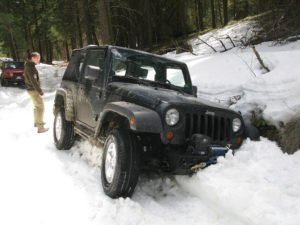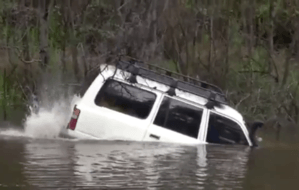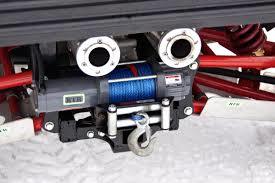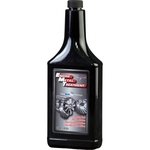4 Wheel and Off Road Mishaps
Men who live and breathe adventure always say that you can never really enjoy what you are doing if you are always too prepared. This very much applies to driving where 4 wheel and off road mishaps are quite common and considered a part of the experience.
In this article, we will enumerate some of the most common causes of 4 wheel and off road mishaps and ways in which how you can prepare and prevent them from happening.

4 Wheel and Off Road Mishaps in Snow
One of the most common mistakes 4WD drivers do when off-roading in snow is driving too fast. Unlike other types of surfaces, snow covers whatever blemishes are in the trail so you can never really know what lies beneath the white stuff. Sometimes the layer of snow can be firm enough that tires can driver over them but most of the time, you’ll find yourself plowing through it with the chances of exposing your vehicle to rocks and other possible hazards below.
How to Deal With Snow Adventure?
The key in off road snow driving is having just enough speed, but not too much that you lose control and have a 4 wheel and off road mishap yourself. Tires are a big deal here. You want the bite and traction… all you can get. Keep your essentials free from excess snow, such as headlights and wipers just in case you do fly off somewhere, you can easily be spotted. Next, try to use chains on your tires because they provide better traction, steering up front, and braking. Chains placed on the front wheels can help you chew easier through deep snow but this can also pose a limitation when going downhill in a slippery slope because of the added braking capability it provides, sometimes too much and the rear of your vehicle will want to come on around you. This is the reason why chains are more recommended to be placed on the rear tires instead.
When you find yourself stuck, resort to rocking the vehicle instead of spinning the tires. Doing the latter will just melt the snow underneath which can make your case worse. Rocking, however, can help you gain a few inches each time which is often already enough to get you on a better surface. As you are rocking forth, try turning the front wheels back and forth as this can sometimes help to grab more traction and open up the path a little wider for the rear wheels to follow.

4 wheel and Off Road Mishaps in Mud
There is a wide variety of soil conditions that you can encounter when off-roading. One of the most common and probably the trickiest among this is mud. One usual mistake when driving in mud is coming down on the road too fast. Doing this does not give the tires a chance to bite through the mud, causing the vehicle to either slide out of control or even roll over.
When off-roading with others, another common source of mishap is getting “hung-up” in the middle of the mud because of the deep ruts left by larger vehicles on the trail. When the ruts are too deep, the center portion usually catches on the axles or causes the mud to clog up your tires.
How to Deal With the Mud?
Survey the trail before going ahead to try it. Poke it with a stick just to see if your tires can manage. When driving through mud or sand, it is best to use a steady momentum to carry through the soil’s consistency. Gear that is too low in mud will spin the types more easily. If the muddy conditions leave you with no choice but to drive in ruts, make sure you know where the front wheels are pointing. If the wheels start to spin, ease on the throttle to let the tires regain traction. Again, aggressive off road mud tires are recommended for this type of terrain for best results. Chains work well in these conditions as well.
 Water Crossing using your 4WD
Water Crossing using your 4WD
Water crossing is not something the inexperienced should definitely do. Not only can it be fatal to the engine of your vehicle, it can also put the life of its occupants on the line as well. One common water mishap is driving too fast while trying to cross a body of water. Doing so can cause water to splash over your hood and even the intake. Going too slow, however, can flood the engine bay. Using the clutch during a stop, reverse, or slow is also a fatal mistake because it can let the water and debris to get between the flywheel and the friction plate.
How to Deal with Water Crossing?
The most important tip you could try to prevent these mishaps is to try to walk the stream you want to cross first. Break out the mud waders and boots and have a rope wrapped around your waist with someone on the bank to reel you back in just in case. The rule is that if you can’t walk into it, your vehicle also can’t possibly cross it. Ease off the accelerator while trying to reach the other side and do not slip the clutch to prevent losing control over your vehicle. Hi rise air intakes that are positioned above the windshield are the standard here. You can only imagine what is happening to your differentials, gear boxes and transmission when fording the deep. Water penetration into these components can cause real problems later if not dealt with properly.
 General Tips for Off-Roading to Prevent 4 Wheel and Off Road Mishaps
General Tips for Off-Roading to Prevent 4 Wheel and Off Road Mishaps
- Always have your phone fully-charged before leaving for your adventure. Check your signal often. Yes, getting into these mishaps can be exciting but you need to have something that can easily let you get help as well.
- Always carry a fire extinguisher and place it in a location you and a passenger can easily reach. This goes for each vehicle in your party.
- Get a good winch. (and we don’t mean your passenger) Make sure that its sized properly for your vehicle’s weight. It is recommended to get one that is double the weight of your rig. Carry a snatch block and additional tow strap as well.
- Carry a spare main leaf and a high-lift jack. Some off-roaders say that they don’t want having these items because of the added weight. Carrying these, however, does not really keep you from conquering your trail. Not having, may just leave you stuck there.
- Be a boy scout. Carry around a shovel, tow rope, extra fuel, food and water, and yes, correct footwear. Having these around can make or break your adventure.
Treat Your Rig Before You Go
4 wheel and off road mishaps will often occur and because of this, you should always treat your engine, transmission, differentials and gear boxes with a quality, water, mud and sand fighting metal conditioner. Many off roaders enjoy this sport until it ends up costing more than it’s worth. CleanBoost® EMT™, for example, is a product that can prevent serious water damage because of its function of treating the metal and staying bonded on these surfaces during these extreme conditions. You can get it at your favorite off-road retailer or purchase it online here.
About the Author
Tech Guy
Automotive enthusiast, passionate about Jeeps, hot-rods, turbos, performance, efficiency, diesels, fuels, high performance oils, additives and anything with an engine.


